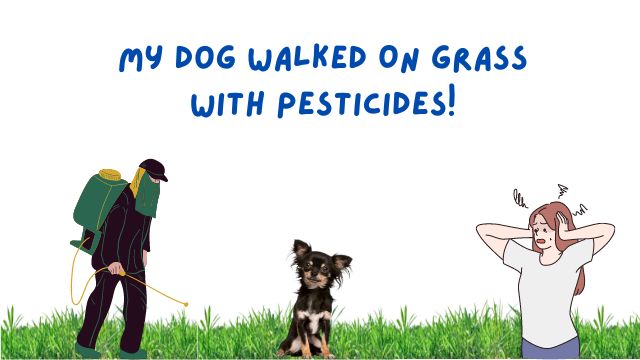So, you just had your lawn treated to keep insects away, but not many hours later, your dog rolls around all over it. That’s enough reason for any dog parent to panic. Just as necessary pesticides are for your greens, what’s equally important is to keep your furballs safe because these toxicants aren’t good for your furry baby.
That said, you can’t keep him away from your lawn, especially on cool evenings when he loves doing dog stuff. But your canine buddy walking on grass treated with pesticides is a real concern as it can lead to some immediate and long-lasting after-effects if you stay careless.
That’s why I am here to address the issue and tell you what could go wrong when your dog walks on the grass with pesticides and how you should react before things go really wrong. So, without waiting, let’s start with how harmful pesticides are for your doggie.

Are Pesticides Harmful to Dogs if They Walk on Them?
Unfortunately, walking over pesticides is extremely dangerous for your pooch. It is unsafe for humans too, but unlike us, dogs cannot go up and wash/change their fur or boots. If your dog rolls around on the grass crazily, toxins will be all over his body. Now he might inhale it, or it may directly enter his digestive system as soon as he decides to lick his body. It would stick to his coat and paw pads, resulting in clinical conditions like your dog puking, flare-ups, inflammation, allergies, or drooling.
You should use pesticides carefully with the intention of keeping your dog or any furry buddy safe. There are considerable chances of getting them poisoned and ending up with serious health conditions. At times your pup might eat or sniff stuff that has been lying around on your lawn. It can eventually cause poisoning, and not knowing the reason behind their illness is equally dangerous.
They may experience different health complications in many different ways. For instance, your dog might eat moths, rodents, or other insects in the grass. These tiny insects might have pesticide residue on their bodies, causing secondary poisoning in your dog.
To avoid that, keep your dog away from the lawn as long as the pesticide’s label says or as the rule of thumb, for at least 48 hours. But let’s suppose your dog has already strolled on the pesticides-filled grass. Let’s find out what you can do.
What Should I Do If My Dog Walks on Grass with Pesticides?
If your dog has already been up for a walk on grass with pesticides, wipe down his coat and paws to get him cleaned thoroughly. Ideally, you shouldn’t let him inside the house until he is all clean because he can transmit toxins indoors, where they may stay for years. Moreover, keep an eye on them so they don’t chew their toys or anything in direct contact with the pesticide grass or lick it because this will poison them.
The chemicals used in pesticides are known to last on grass for up to a good 48 hours after application. If your dog has been in contact with pesticides before this time, you must take him to the vet as soon as possible. It doesn’t matter whether he has inhaled or ingested the pesticide, but make sure to have him properly checked to avoid getting into serious health trouble.
Possible signs of your dog ingesting any poisonous compounds might include getting a respiratory arrest or even seizures in your dog. Other severe symptoms that can last for days or even weeks might include muscle twitching, chronic anorexia, and muscle weakness. These conditions sound severe, but only your vet can provide suitable treatment.
In most cases, if the treatment is provided at the right time, getting your dog healthy as soon as possible would be much easier. Ensure you do not ignore any unusual symptoms and get them treated by a competent vet. And adopt this healthy habit of cleaning up your dog after a stroll or any outdoor adventure.
How Can I Prevent This Better in The Future?
Keep your dog away from the grass or lawn treated with pesticides until it gets completely dry. Ensure the grass is well ventilated after the treatment, and keep the chewable toys, bones, beddings, and food bowls away from this area. Additionally, if you’re walking your pup, ensure the leash is short so it would be easier for you to control them.
As the saying goes, prevention is always better than the cure, so try to clean your puppy’s paws as soon as he is back from a walk or playing outdoors, along with keeping an eye on your pooch while he plays in the garden. Also, look out for the things on the sidewalks and refrain your dog from nibbling on them. This way, you won’t have to worry about any possible health threats.
If you have been using granular pesticides on your grass, then try to keep your dog away from the grass for at least 48-72 hours. Basically, granular pesticides are a bit complex chemicals as they are bound to last longer to provide plants with better nutrients and usually take some time to dissolve completely. The longer you make your dog avoid contact with the lawn after, the better it would be.
Conclusion
In this article, we discussed what can happen if your dog walks on the grass with pesticides. As a precautionary measure, make your treated lawn foolproof for your pets and kids if you don’t want to cause them unnecessary illness. If your dog just had a stroll on the grass, clean him up quickly and ensure he doesn’t lick his body or paws. He should be alright if you get to him before any further action. But if he chews on something that was directly contacted with herbicides, better to go for a check-up instead of waiting for the symptoms.

